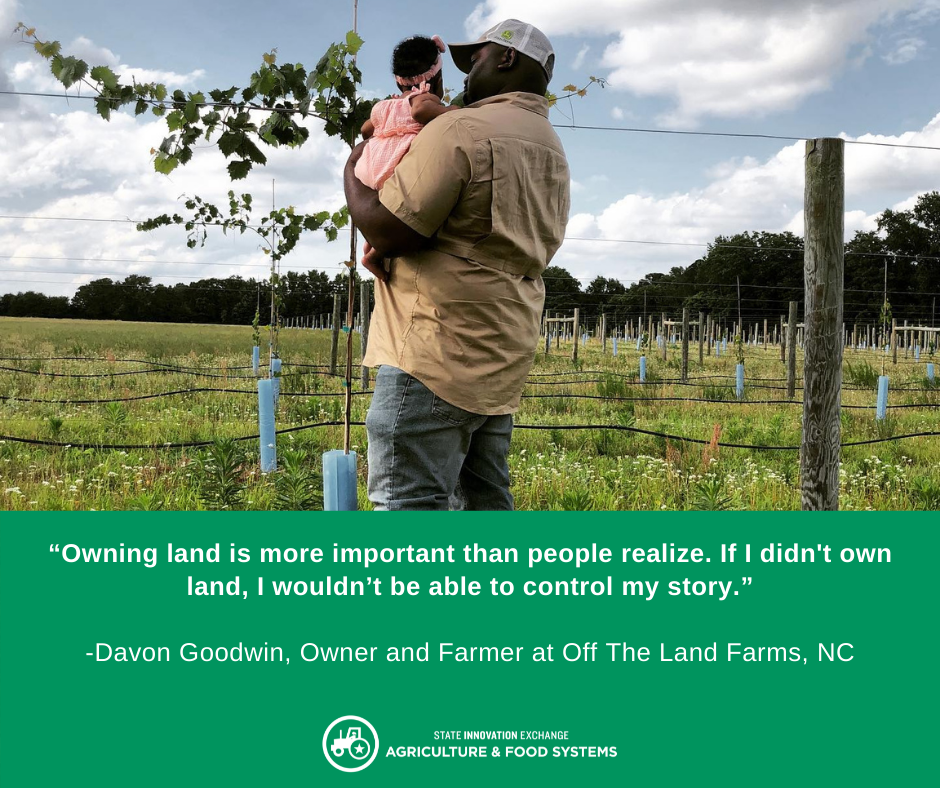Davon Goodwin is a first generation Black farmer and is the owner-operator of Off The Land Farms in Laurinburg, North Carolina. He currently produces muscadine grapes, blackberries and mixed vegetables on his 42-acre farm. Davon is also the director of Sandhills Ag Innovation Center, a local food hub that is an important component of the local sustainable agriculture and local food scene. This interview was conducted over zoom and was shortened for length and clarity. This is part two of two. You can read part one here.
What is the main misconception you feel legislators and the general public have about farming?
I don’t think the public and legislators understand how hard farming is. You’re essentially gambling at a table where you don’t have control over any of it. You don’t control the weather, you don’t control seed prices, you don’t control fertilizer prices. It’s like you’re in a game where you don’t control any of the variables that dictate your success or failures. At any given time, if one of those variables goes wrong, you’re at the brink of failure. When I look at what legislation and public policy we need to be driving, I really want legislators to understand that farming is risky.
To do that, they need to get out of the office and talk to the people on the ground. We have been removed from the farm and that big disconnect from farming and our way of life is causing us major issues. Legislators are not taking an agriculture-forward approach to policy. It would be good if they and the general public would visit and really see how a family farm works, because it is one of the most stressful industries you can be in. When all your money is out in the field, that’s a scary place to be. As climate change starts affecting us more and more every year, it’s going to become even more of a priority for legislators to talk to farmers that are being impacted.

What are some of the ways that legislators can better support farmers of color when it comes to agriculture policy?
Being a farmer of color, we’ve always been resource-limited from day one. The American Rescue Plan with the $5 billion given to farmers of color is just a drop in the bucket of what’s needed for Black farmers. And when I look at how climate change is going to affect white farmers, who generally have more resources to make changes towards climate resilience, versus how it will impact BIPOC farmers who are not able to make our farms climate resilient, it is not the same. We’re going to continue to struggle. We need to think about policy that supports Black farmers and the environment.
But it’s not just climate issues; there are fewer than 35,000 Black farmers left in this country. While there is a resurgence of young Black farmers getting into farming, our land ownership numbers are not going up. Owning land is more important than people realize. If I didn’t own land, I wouldn’t be able to control my story. We need more policy around land ownership for Black farmers. The public doesn’t really understand how history has played such a factor in today’s agriculture. We have to learn our history and how we got here and what else needs to be done to make sure that as a country, we become more resilient around agriculture.

What’s some of your favorite parts about being a farmer?
As a returning veteran, farming probably saved my life. I went through some very dark times after coming back from war, and if I didn’t have farming, PTSD probably would have gotten the best of me. Farming gives me a therapeutic outlet that nothing else does. My favorite part is just putting my hands in the dirt. I really feel like it changes you, it’s very calming.
Another favorite part is getting to rewrite that narrative. I look at where I came from and at my ancestors — they paid a hell of a debt for me to be able to do what I do now. They had to suffer, some gave their life for me to be able to be a landowner. Those days when it’s hard and you’re not making any money and it’s raining, I tell myself: I don’t just owe this to myself, I owe it to the people who came before me and were willing to give up everything for me to have the privilege to be a landowner. It’s very empowering to say I work for myself, and to have my community be able to tell its story of why this farm is important and to do it in a way that is not demeaning to them, but is inspiring.
Check out the latest from Off The Land Farms here.

